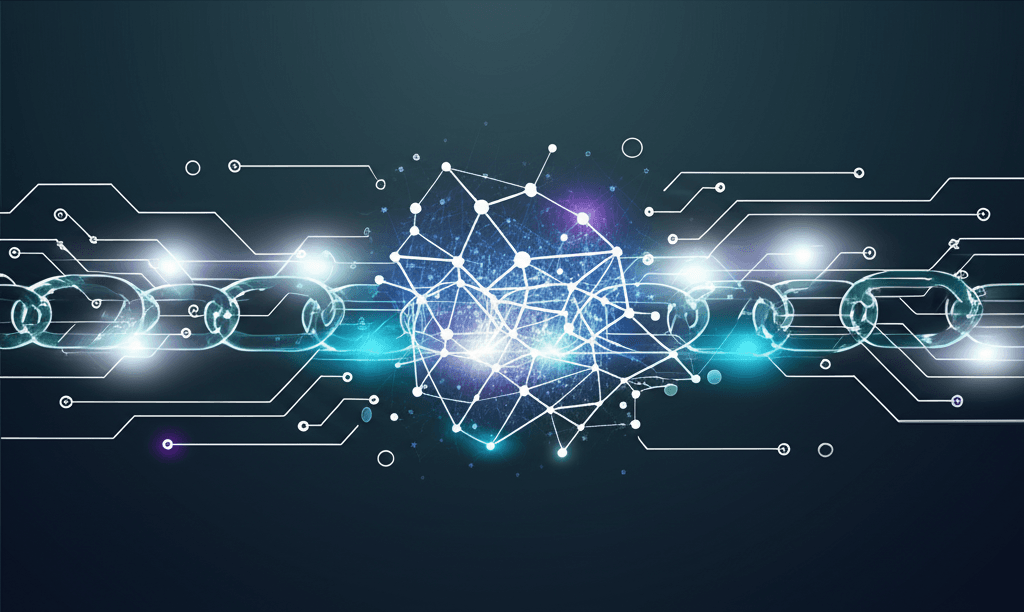AI Blockchain Redefines AI: Unlocking Decentralization and Trust
Bridging AI's power with blockchain's trust: creating decentralized, secure, and transparent intelligent systems.
June 10, 2025

Artificial intelligence is rapidly reshaping industries, but its increasing prevalence brings concerns about the centralized nature of the infrastructures it relies upon. Learning from the decentralized principles of cryptocurrencies, the concept of an "AI blockchain" has emerged, proposing a powerful synergy between these two transformative technologies. At its core, an AI blockchain seeks to leverage the inherent characteristics of blockchain – such as decentralization, immutability, and transparency – to address some of the critical challenges and risks associated with current AI development and deployment, including data privacy, security, and the concentration of power within a few large entities.[1][2][3] It’s a move towards creating more trustworthy, resilient, and potentially democratized AI systems.[1][3]
The convergence of AI and blockchain technology is built on their complementary strengths.[4][5] Blockchain, a distributed and immutable ledger, offers a secure and transparent way to record transactions and manage data without a central authority.[6][7] This is particularly valuable for AI systems, which often require vast amounts of high-quality, verifiable data for training and operation.[8] By storing data or data hashes on a blockchain, AI models can benefit from enhanced data integrity and provenance, making it possible to trace the origin of data and ensure it hasn't been tampered with.[6][8] This addresses the "black box" problem in AI, providing an audit trail for AI decisions and data usage.[6] Furthermore, blockchain can facilitate decentralized AI training, where multiple parties can contribute to model development without directly sharing sensitive raw data, preserving privacy through techniques like federated learning.[4][1][9] In return, AI can enhance blockchain technology itself.[4] For instance, AI algorithms can optimize blockchain operations by improving energy efficiency in consensus mechanisms, managing transaction loads more effectively, and enhancing the intelligence of smart contracts, which are self-executing contracts with predefined rules stored on the blockchain.[4][7][10] AI can also analyze blockchain data for patterns, identify anomalies, and improve security by detecting potential threats or fraudulent activities in real-time.[5][11][12]
The potential applications of combining AI and blockchain span numerous sectors. In healthcare, AI can analyze patient data for diagnostics and personalized treatment, while blockchain can secure patient records, ensure data integrity, and manage consent for data sharing.[4][6][7] This combination can improve interoperability between healthcare systems while maintaining privacy.[4] The pharmaceutical industry can benefit from increased visibility and traceability in drug supply chains and more efficient clinical trials.[6] In finance, AI-driven fraud detection can be significantly enhanced by the immutable and transparent record-keeping of blockchain.[4][13][14][15] Smart contracts powered by AI can automate complex financial agreements and processes, reducing the need for intermediaries and increasing transaction speed.[6][7][16] Supply chain management is another key area, where blockchain provides a transparent and tamper-proof record of goods as they move through the chain, and AI offers predictive analytics for demand forecasting, inventory optimization, and logistics improvement.[4][6][8][14] This synergy leads to greater efficiency, reduced delays, and enhanced fraud prevention.[8][14] Other notable use cases include decentralized AI marketplaces where algorithms and data can be securely traded, improved data verification for identity management, and the creation of more robust and transparent Decentralized Autonomous Organizations (DAOs).[16][11][12]
Despite the immense potential, the integration of AI and blockchain is not without significant challenges. Scalability is a primary concern, as current blockchain networks often face limitations in transaction speed and throughput, which can hinder real-time AI applications requiring high-frequency data processing.[4][7][8][5] Solutions like layer-2 scaling protocols and sharding are being explored to address these bottlenecks.[4] The computational power required for both complex AI algorithms and blockchain operations, particularly proof-of-work consensus mechanisms, raises concerns about energy consumption and sustainability.[8][10] Data privacy, while potentially enhanced in some aspects, also presents challenges; the transparency of public blockchains could expose sensitive information if not carefully managed, though techniques like zero-knowledge proofs and federated learning aim to mitigate these risks.[8][11] Furthermore, the technical complexity of integrating these two sophisticated technologies requires specialized expertise, which can be a barrier for many organizations.[8] Regulatory uncertainty also looms large, as legal frameworks are still evolving to address the unique aspects of both AI and blockchain, let alone their combination.[7] Addressing issues like data ownership, liability for AI-driven decisions on a blockchain, and the legal standing of smart contracts is crucial for wider adoption.[7]
In conclusion, the AI blockchain represents a promising, albeit nascent, frontier in technology. The potential to create more secure, transparent, auditable, and decentralized AI systems by leveraging the strengths of blockchain is substantial, offering solutions to critical issues of trust, privacy, and centralization that currently beset the AI industry.[4][5][13] From revolutionizing how data is managed and AI models are trained to enabling new forms of decentralized intelligence and automation across various sectors like healthcare, finance, and supply chain management, the impact could be transformative.[4][6][14] However, realizing this full potential requires overcoming significant technical hurdles related to scalability, energy consumption, and complexity, as well as navigating an evolving regulatory landscape.[4][7][8] Continued research, development, and collaboration between AI and blockchain experts, alongside thoughtful policymaking, will be essential to unlock the true capabilities of the AI blockchain and shape its responsible integration into the fabric of our increasingly intelligent and interconnected world.[7][17]
Sources
[1]
[2]
[4]
[5]
[6]
[10]
[11]
[12]
[13]
[14]
[15]
[17]